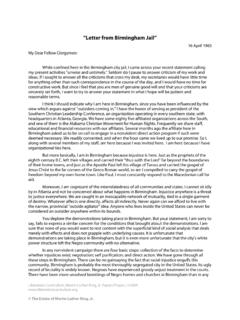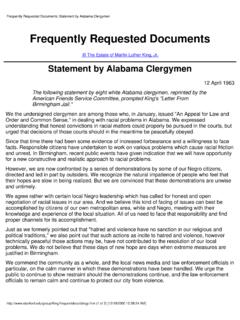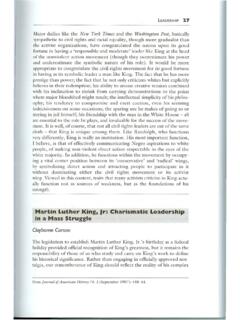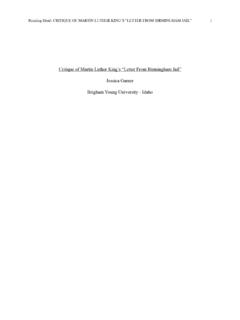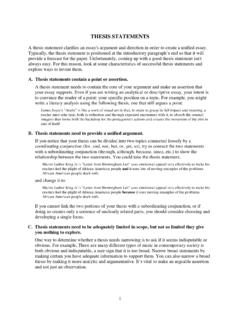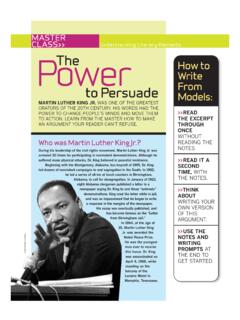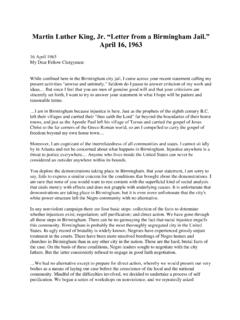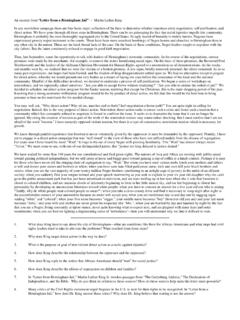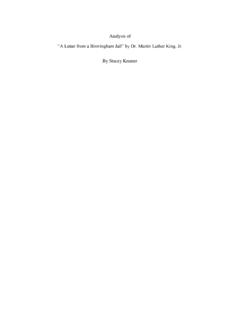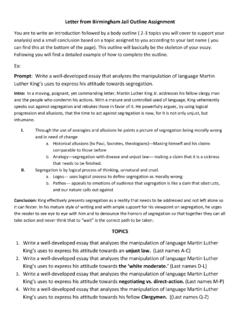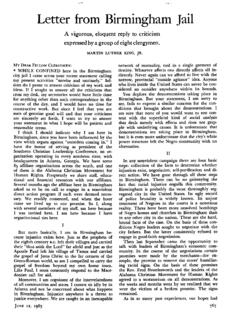Transcription of Letter from Birmingham Jail Analysis 2 - Martin Luther King
1 Liberation Curriculum, Martin Luther King, Jr. Papers Project, 2004 Letter from Birmingham jail : Analysis 2 On April 12, 1963 King was arrested for breaking an Alabama injunction against demonstrations in Birmingham . He was placed in solitary confinement and on April 16th he read a Letter from Alabama clergymen published in the New York Times in which they criticized King and the Birmingham Movement for inciting civil disturbances. King wrote his response along the margin of the paper. The following version has been edited.
2 Directions: Be an active reader by underlining key phrases and writing comments or questions in the margin. Answer the questions in italics on a separate sheet of paper. 16 April 1963 My Dear Fellow Clergymen: While confined here in the Birmingham city jail , I came across your recent statement calling my present activities "unwise and untimely." Seldom do I pause to answer criticism of my work and ideas. If I sought to answer all the criticisms that cross my desk, my secretaries would have little time for anything other than such correspondence in the course of the day, and I would have no time for constructive work.
3 But since I feel that you are men of genuine good will and that your criticisms are sincerely set forth, I want to try to answer your statement in what I hope will be patient and reasonable terms. I think I should indicate why I am here in Birmingham , since you have been influenced by the view which argues against "outsiders coming in." I have the honor of serving as president of the Southern Christian Leadership Conference, an organization operating in every southern state, with headquarters in Atlanta, Georgia.
4 We have some eighty five affiliated organizations across the South, and one of them is the Alabama Christian Movement for Human Rights. Frequently we share staff, educational and financial resources with our affiliates. Several months ago the affiliate here in Birmingham asked us to be on call to engage in a nonviolent direct action program if such were deemed necessary. We readily consented, and when the hour came we lived up to our promise. So I, along with several members of my staff, am here because I was invited here.
5 I am here because I have organizational ties here. But more basically, I am in Birmingham because injustice is here. Just as the prophets of the eighth century left their villages and carried their "thus saith the Lord" far beyond the boundaries of their home towns, and just as the Apostle Paul left his village of Tarsus and carried the gospel of Jesus Christ to the far corners of the Greco Roman world, so am I compelled to carry the gospel of freedom beyond my own home town. Like Paul, I must constantly respond to the Macedonian call for aid.
6 What are Kings reasons for being in Birmingham ? How does King answer to the charge of being an outsider? Moreover, I am cognizant of the interrelatedness of all communities and states. I cannot sit idly by in Atlanta and not be concerned about what happens in Birmingham . Injustice anywhere is a threat to justice everywhere. We are caught in an inescapable network of mutuality, tied in a single garment of destiny. Whatever affects one directly, affects all indirectly. Never again can we afford to live with the narrow, provincial outside agitator idea.
7 Anyone who lives inside the United States can never be considered an outsider anywhere within its bounds. The line in bold print is considered one of the King s most famous quotes. What does this mean for individual s who have ignored the issues of Birmingham ? What does this mean today for each of us living in United States? You deplore the demonstrations taking place in Birmingham . But your statement, I am sorry to say, fails to express a similar concern for the conditions that brought about the demonstrations.
8 I am sure that none of you would want to rest content with the superficial kind of social Analysis that deals merely with effects and does not grapple with underlying causes. It is unfortunate that demonstrations are taking place in Birmingham , but it is even more unfortunate that the city's white power structure left the Negro Liberation Curriculum, Martin Luther King, Jr. Papers Project, 2004 community with no alternative. In any nonviolent campaign there are four basic steps: collection of the facts to determine whether injustices exist; negotiation; self purification; and direct action.
9 We have gone through all these steps in Birmingham . There can be no gainsaying the fact that racial injustice engulfs this community. Birmingham is probably the most thoroughly segregated city in the United States. Its ugly record of brutality is widely known. Negroes have experienced grossly unjust treatment in the courts. There have been more unsolved bombings of Negro homes and churches in Birmingham than in any other city in the nation. These are the hard, brutal facts of the case. On the basis of these conditions, Negro leaders sought to negotiate with the city fathers.
10 But the latter consistently refused to engage in good faith negotiation. What are the four basic steps of nonviolent direct action? For each of the steps state the example in Birmingham . Can you think of another historical (local, national, global) example of nonviolent protest which followed these steps? Then, last September, came the opportunity to talk with leaders of Birmingham 's economic community. In the course of the negotiations, certain promises were made by the merchants--for example, to remove the stores humiliating racial signs.
